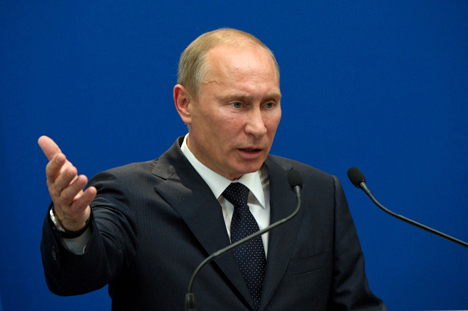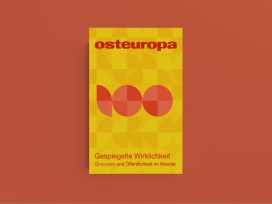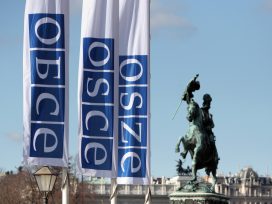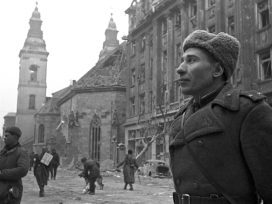Sanctions on Russia may tip economic stagnation into recession and widen the country’s gap with western nations still further. This time Putin seems to be plying an isolationist course without regard for the consequences, writes Maria Lipman.
In August 2014 Vladimir Putin’s approval rating reached 87 per cent. At the same time, 66 per cent of Russians believe the country is on the right track, compared to 43 per cent at the beginning of the year. This despite the negative developments in Russia that have been stacking up fast: the country is facing economic sanctions and its economy is stagnant at best, with a recession looking likely.1 Anxious to reciprocate the sanctions, the government introduced a ban on foods imported from countries participating in the anti-Russian measures. The government is warning that the ban may be extended to other industrial imports and that Siberian airspace may be closed to western airlines.

Vladimir Putin during a work visit at Matignon in June 2011, Photo: Frederic Legrand. Source:Shutterstock
Officials and commentators across the spectrum outdo each other in pledging allegiance to the isolationist course. Dmitry Rogozin, a high-ranking government official in charge of the defence industry, says that Russia “should first and foremost rely on its own strengths […] especially in matters of defence and security”. Rogozin pledged to replace imports and modernize the defence industry “in a matter of months”. Putin’s economic adviser Sergey Glaziev published a lengthy treatise on the benefits of economic self-reliance and state dominance – a system increasingly similar to the Soviet command economy. Loyalists celebrate a future without French cheese, Lithuanian dairy products and Polish apples; the Russian diet will be healthier, they say, and the import ban will boost domestic food production. The author Yegor Kholmogorov, an extreme nationalist, wrote a column in the pro-Kremlin daily Izvestia extolling domestic foods; to prove his point he listed some of the delicacies on sale in imperial St Petersburg over a century ago.
The loyalists’ plans and pledges sound more like dreams. Experts who dare voice alternative opinions warn of an imminent rise in prices and a lower quality diet for consumers; other consequences may include food shortages and government-controlled pricing. However in Russia, which for centuries has sought to catch up with the world’s most developed nations, shrewd feasibility analysis is not infrequently replaced by talk of miraculous “breakthrough”. These days, isolationism may serve as effective propaganda, but as an economic policy it will not lead to a technological or economic “breakthrough”. Moreover, it is deeply damaging to Russia and its future.
It is common to think of Putin as a tactician rather than a strategist. Indeed, throughout his years in power he has repeatedly demonstrated tactical skill, effectively handling inauspicious and even calamitous developments, including terrorist attacks, natural disasters, technogenic catastrophes, wars, economic crisis and mass protests. His foreign policy has been mostly reactive, responding to initiatives of the United States and the West. If his long-term vision of Russia’s future has been vague, his tactical manoeuvres more often than not enabled him to achieve short-term objectives. He remains highly popular among the Russian people and has gained the reputation of being a tough and cunning player on the world stage.
However it would be wrong to assume that Putin has no strategic goals. At least two major priorities can be traced throughout his reign as the supreme leader of Russia: control at home and sovereignty on the world stage.
Control
From the start of Putin’s leadership back in 2000, control at home has meant a solid monopoly on political power unconstrained by checks and balances. Politics was soon cleansed of any unwanted players, leaving Putin unchallenged and uncontested as the top decision-maker. He was supported by an ever loyal bureaucracy that did not have to worry about public accountability. The economic model matched the pattern of centralized government. Despite repeated pledges of diversification, the economy remained resource-based The most lucrative industries, first and foremost oil and gas, came under Kremlin control, either through direct state ownership or by entrusting them with loyal owners. If private companies were deemed strategically important, they were de-facto denied full disposal over their assets. This way, the government could amass a gigantic resource rent – the high and rising price of oil was an invaluable contribution to the efficiency of Putin’s project. The Kremlin then redistributed the income as it saw fit – in order to secure the loyalty of the bureaucracy, and especially of the security agencies, as well as to keep the bulk of the population reasonably content.
This model of governance was hardly conducive to economic development. It undermined modernization; it discouraged private initiative; it kept decision-making non-transparent and productivity low; it generated corruption and extinguished even the hope of the rule of law. But Putin was willing to pay this price for his strategic priority. If economic efficiency came into conflict with domestic control, whether in politics or the economy, over the elites or the broader public, Putin opted for control. Still, his policy remained reasonably balanced and pragmatic: by early 2008, near the end of his second presidential term, he had delivered stability, substantial economic growth and higher living standards.
Sovereignty
Putin’s other top priority can be described as the urge to secure Russia against any interference from the West, whether in internal affairs or in Russian interests in the world, above all the former Soviet space. For Putin, Mikhail Gorbachev’s easing of domestic control and opening up to the West, a policy that allowed the collapse of the Soviet Union, was a national disaster.2 This mindset regards the first post-Communist decade, not unreasonably, as a time when Russia suffered humiliation by the West, first and foremost by the United States, took advantage of its weakness.
Putin undertook to counter such policies and force the West to reckon with Russia. Realizing Russia’s weakness, he avoided a direct standoff and instead played the role of the difficult and stubborn partner. Putin by no means sought isolation. He sought recognition and wanted Russia to benefit from better economic relations with the West. But although attracting foreign investment was high on his list of priorities, sovereignty was higher still. As with control at home, if defending Russia’s national interests, geopolitical and otherwise, conflicted with beneficial economic cooperation with the West, Putin would never compromise on sovereignty. In this sphere, too, he managed to maintain a balance. During the 2000s, despite inevitable setbacks, relations with the West returned to business as usual. Moreover, Putin scored a number of important tactical victories: for instance, he effectively opposed NATO expansion to include Georgia and Ukraine, and prevented the deployment of elements of the American missile defence in Poland and the Czech Republic. He deftly took advantage of the differences between the United States and Europe and between members of the European Union. He could pride himself on winning reluctant recognition on the world stage as a skilled, if unpleasant, political leader.
Putin’s return to the Kremlin
The beginning of Putin’s third presidency was marked by mass public protests and the slowdown of economic growth. The former called for tighter controls over politics and society and increased funding for the security agencies. The latter put a strain on the Kremlin’s material resources. In order to rally the support of the conservative majority, the Kremlin opted for a harshly anti-western (and especially anti-American) line, which led to steady deterioration of relations with the West. Putin’s policies were losing balance: the rising costs of control and sovereignty were compromising a Russian economy already in decline.
Early this year, as the crisis in Ukraine was rapidly escalating, Putin’s conflict between sovereignty and national development became more acute than ever. He remained adamant, of course, on his strategic priorities, but this time round he appeared unconcerned about the costs. Putin’s dramatic moves – the annexation of Crimea, the covert assistance to the anti-Kyivan rebels in eastern Ukraine, the equivocal stance on the shooting down of the Malaysian airliner – have led to overt confrontation with the West. A return to business as usual is now out of the question. The sanctions will gravely weaken Russian finances and lower people’s living standards. The restricted access to modern technologies threatens to widen the gap between Russia and the developed nations. Meanwhile, further and deeper sanctions are not unlikely. “A prolonged confrontation with the West”, wrote Clifford Gaddy and Barry Ickes in June, “even without direct conflict, will make the prospects for Russia’s evolution as a modern society more remote”.
Putin’s policy has also deeply damaged his ambition to raise Russia’s global stature. He sought to achieve recognition for Russia as a great nation of the world, the leader of the former Soviet region and perhaps even further afield. Ukraine was seen as the key member of the “Russian realm”, Russia’s sphere of influence that Putin aspired to secure. But as Kremlin propaganda condemned the Ukrainian government as “fascist” or a “junta”, and as Putin’s policy turned a once brotherly nation into an outright enemy, those former Soviet countries that had friendly ties with Russia started getting concerned.
The leaders of the West make angry statements and introduce harsh policies; mainstream western media refers to Putin’s Russia as a pariah state. Putin responds by saying that “Russia is fortunately not a member of any alliance. This is also a guarantee of our sovereignty”. His words demonstrate a conscious or unconscious oblivion of Russian membership of several alliances of former Soviet states and the Shanghai Cooperation Organization. Putin’s message conveys more than Russia’s definitive separation from the West: it is a statement of national isolation.
Since his return to the presidency in 2012, Putin has altered his generally pragmatic course to one that is increasingly ideological. This is focused on quasi-traditionalism, state nationalism and a siege mentality, and on pitting the paternalistic majority against modern and westernized minorities. Modernization has been removed from Putin’s agenda; the “new economy” that emerged during the post-Soviet development was increasingly getting in Putin’s way. In 2014, the combination of isolation by the West and isolationism from within has thoroughly reinforced Russia’s anti-modernization course.
Putin’s Russia is not facing imminent collapse. As Gaddy and Ickes put it, Russia’s resource-based economy may be weak, but it is not fragile. The price of oil remains high, and the vast majority of the population will continue to rally behind Putin – the leader who defends them against the western enemy. Thanks to Russia’s vast nuclear arsenal and her veto power in the UN Security Council, Putin will continue to have a say in international affairs. But whatever his earlier ambitions for Russia’s national development, Putin’s choice has been reduced to that of the commander of a fortress under siege.
In August 2014, Andrey Klepach, the chief economist of the Russian VEB bank, said that the Russian economy was in "technical recession" (a decline of GDP for the first two quarters of 2014). See: http://top.rbc.ru.
The majority of the Russian people share a negative perception of Gorbachev and his policy of perestroika, and this sentiment has barely changed in the past decade. In a 2013 national poll only 16 per cent thought that Gorbachev's perestroika did Russia more good than bad, while 66 per cent believed that it did more bad than good. As for Gorbachev himself, in another 2013 national poll he turned out to be the least popular of all the twentieth-century Russian leaders: only 22 per cent were positive towards him, while 66 per cent had a negative opinion (compared to Joseph Stalin's 50 per cent positive and 38 per cent negative, and Leonid Brezhnev's 56 per cent to 29 per cent.
Published 22 August 2014
Original in English
First published by Eurozine
Contributed by IWMpost © Maria Lipman / IWM / Eurozine
PDF/PRINTPublished in
In collaboration with
In focal points
Newsletter
Subscribe to know what’s worth thinking about.
Related Articles

In the spirit of the times and against the grain
Osteuropa 1–3/2025
Osteuropa at 100: Manfred Sapper on the history of the journal from Weimar to the present; Gerd Koenen on a century of German–Russian projections; Katharina Raabe on eastern European literature in translation; Dorothea Redepenning on the bilateral politics of classical.

After the catastrophic performance of the traffic light coalition, what Germany needs is a strong, unified government able to provide an antidote to the new fascism. Friedrich Merz must begin by rebuilding trust, writes the editor of ‘Blätter für deutsche und internationale Politik’.






